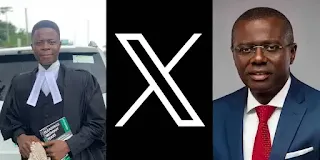Prominent Nigerian lawyer and civil rights advocate, Festus Ogun, has announced plans to initiate legal proceedings against Lagos State Governor Babajide Sanwo-Olu for blocking him on X (formerly Twitter).
Ogun, in a post shared via his official handle @mrfestusogun, stated that he has been unable to access the governor’s posts for nearly three years, which he argues is a violation of his fundamental right to freedom of expression, particularly as a resident of Lagos.
“For about three years, Babajide Sanwo-Olu has blocked me on Twitter. August 2025, I will be approaching the court for legal remedies,” Ogun wrote.
He further emphasized that the action of the governor amounts to censorship and discrimination in a digital public space where government policies and activities are often communicated.
“As a Lagos resident, I am convinced that my blocking is an attack on my constitutional right to freedom of expression,” he added.
Reactions Trail Legal Threat
Ogun’s declaration has stirred debate online, with users weighing in on whether public officials should be allowed to block citizens on social media platforms especially when such platforms are used for official communication and public engagement.
Here are some of the reactions:
-
@kinpelG noted: “With the new Twitter features, you can still view his posts. You just can’t reply.”
-
@toplegalsage recalled a similar legal precedent abroad: “Interesting. I remember a UK case where the court ruled that public office holders cannot restrict public access to their online posts. You’ve got a sharp legal mind, FO.”
-
@Nehem11 asked a clarifying question: “Is the block from his personal handle or the official Lagos State Government handle? If it’s personal, can it still be seen as a breach of constitutional rights?”
-
@pioneerjoshua8 shared a similar experience: “I was blocked by Bola Ahmed Tinubu himself. INEC did the same in 2023. It’s like these government agencies and officials are allergic to accountability.”
-
@FadaChristmas_ expressed skepticism: “Do Nigerian courts even uphold justice or human rights anymore? Our judiciary has become a cash-and-carry affair. What a shame.”
The Broader Context
This case, if pursued, could have significant implications for digital rights, governance transparency, and the legal boundaries of official conduct on social media in Nigeria. In countries like the United States and the United Kingdom, courts have ruled that elected officials cannot block citizens from public forums online or offline when those platforms are used to conduct public business.
Should Ogun proceed with his legal action, it could set a historic precedent in Nigeria regarding the intersection of constitutional rights and digital platforms, especially in an era where social media serves as a critical channel for public discourse, civic engagement, and governmental accountability.



Post a Comment